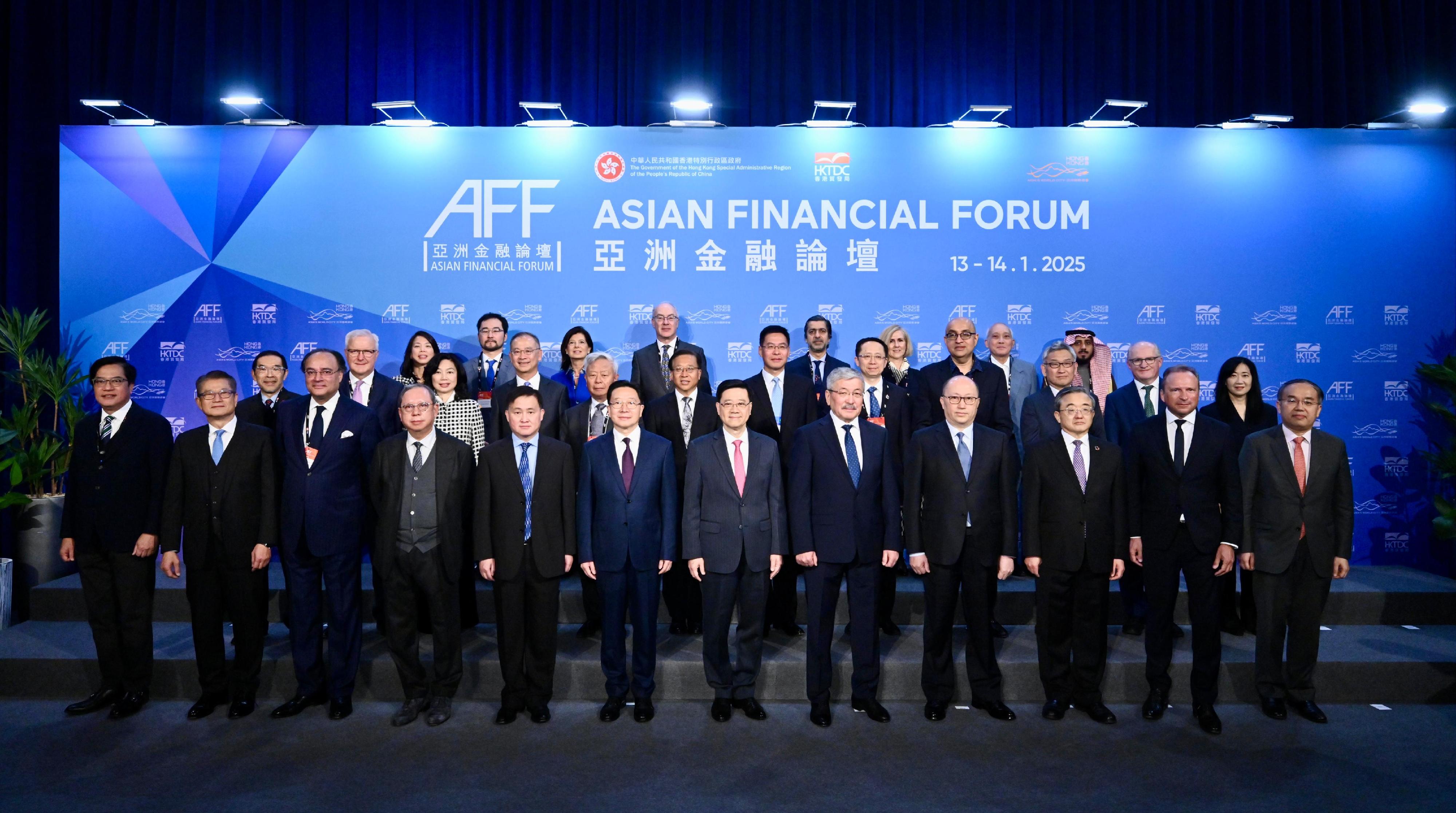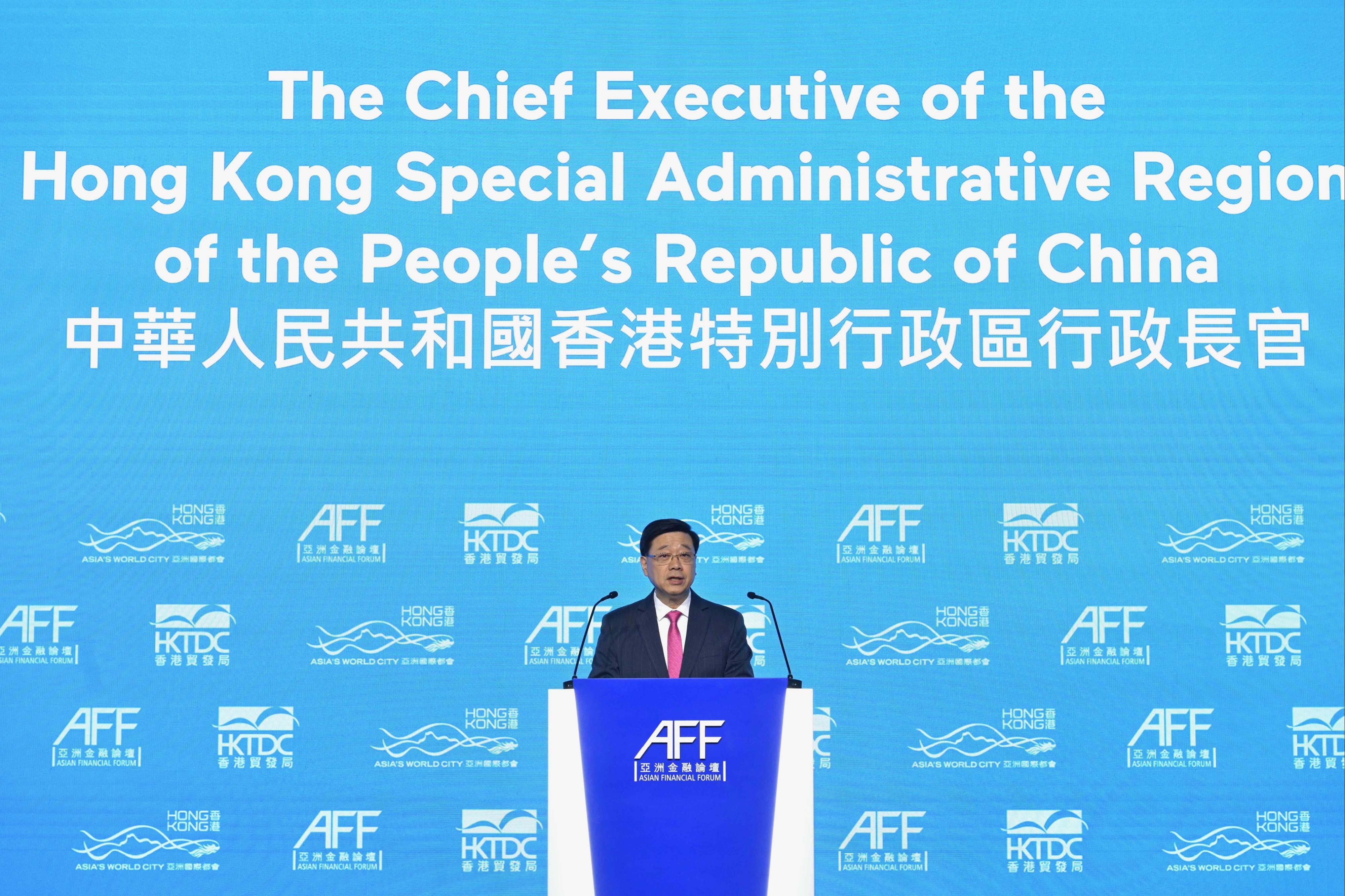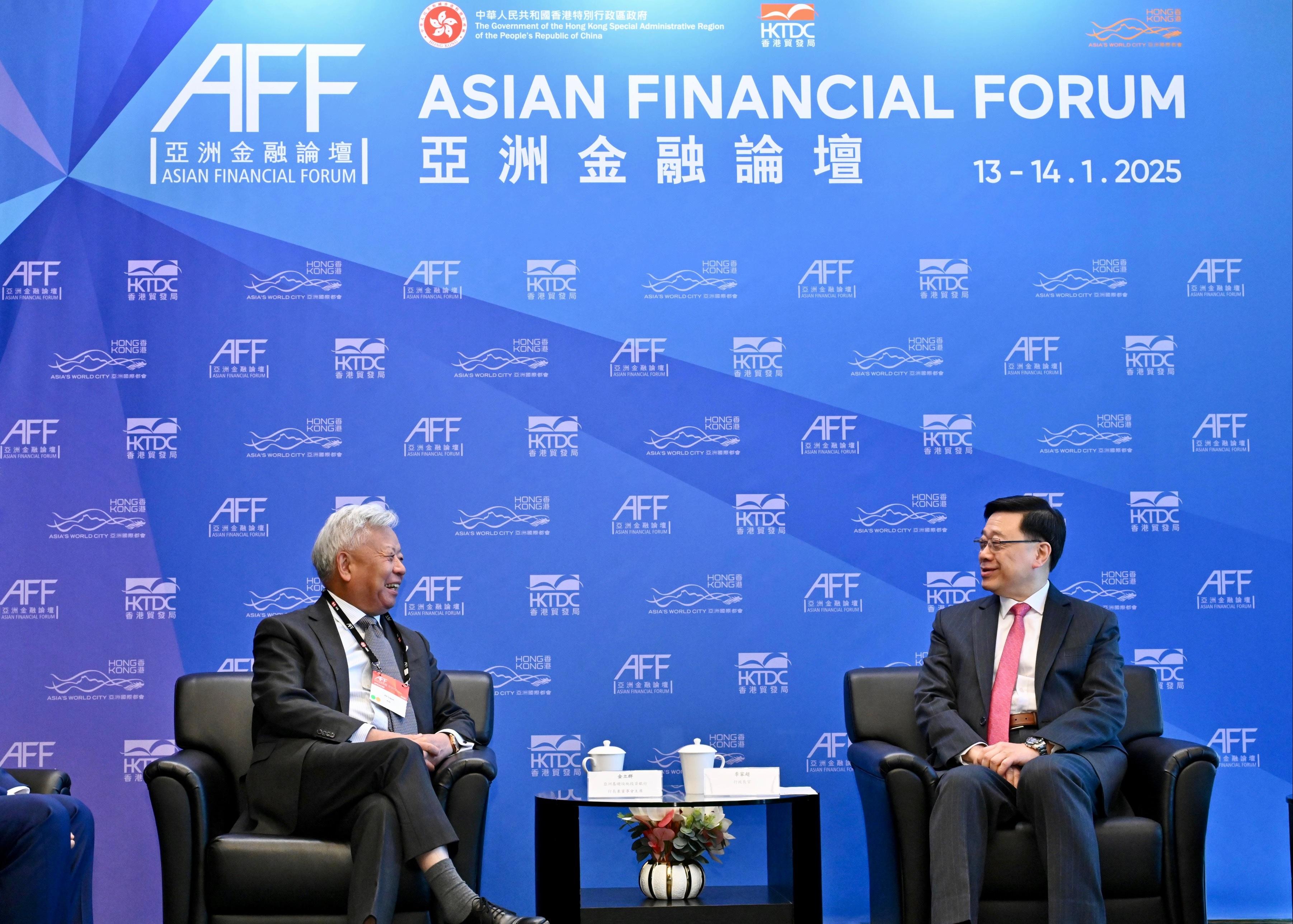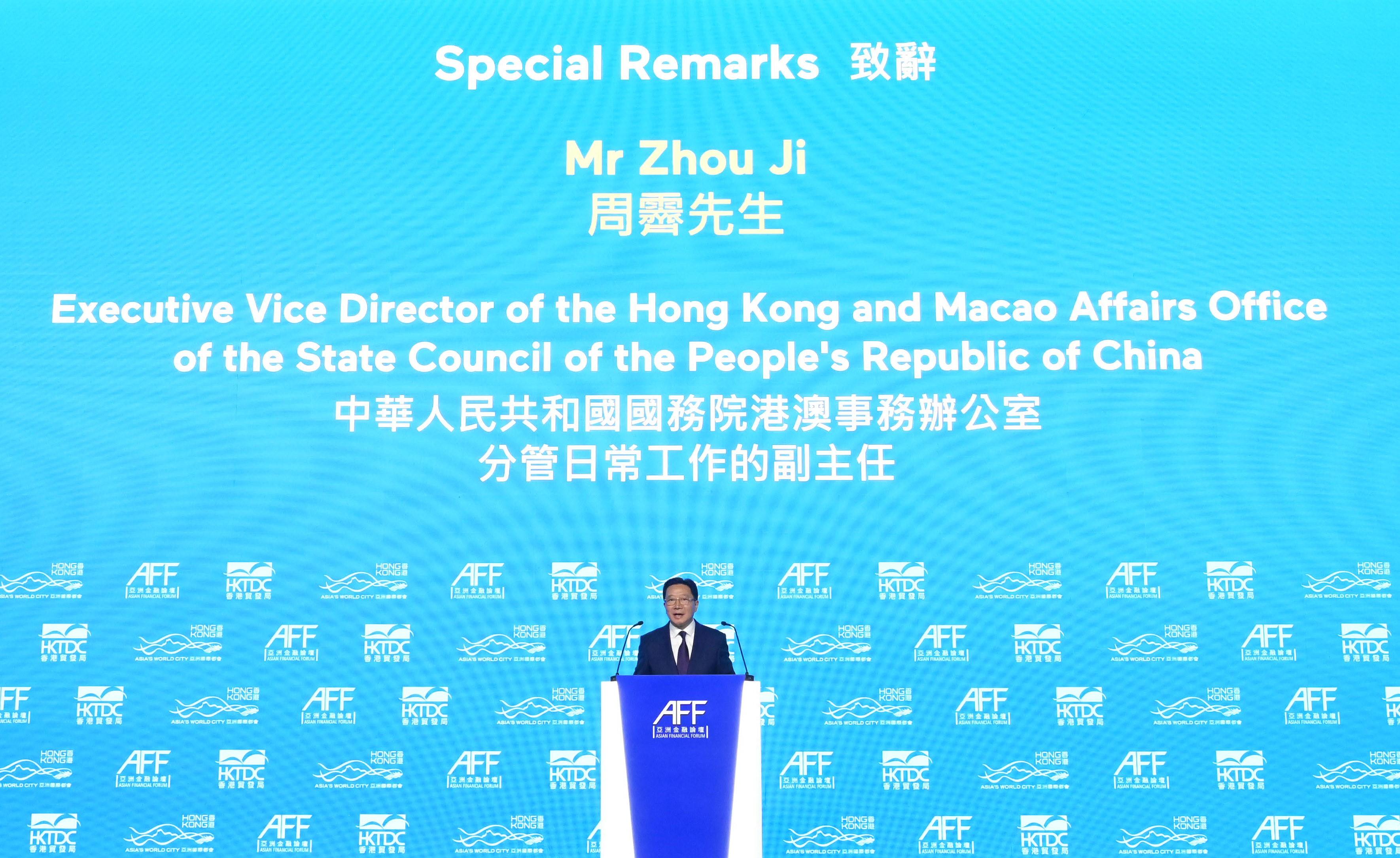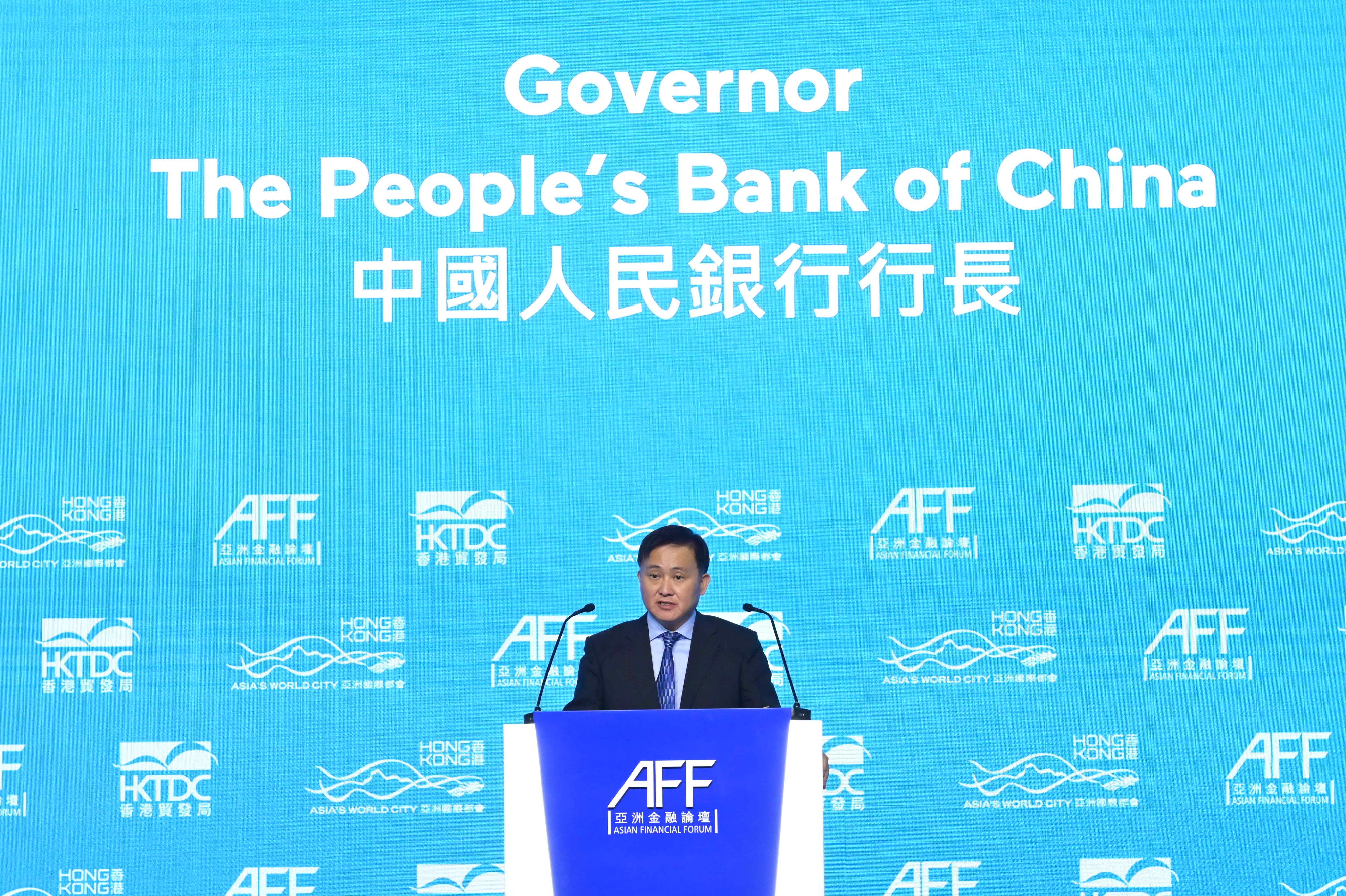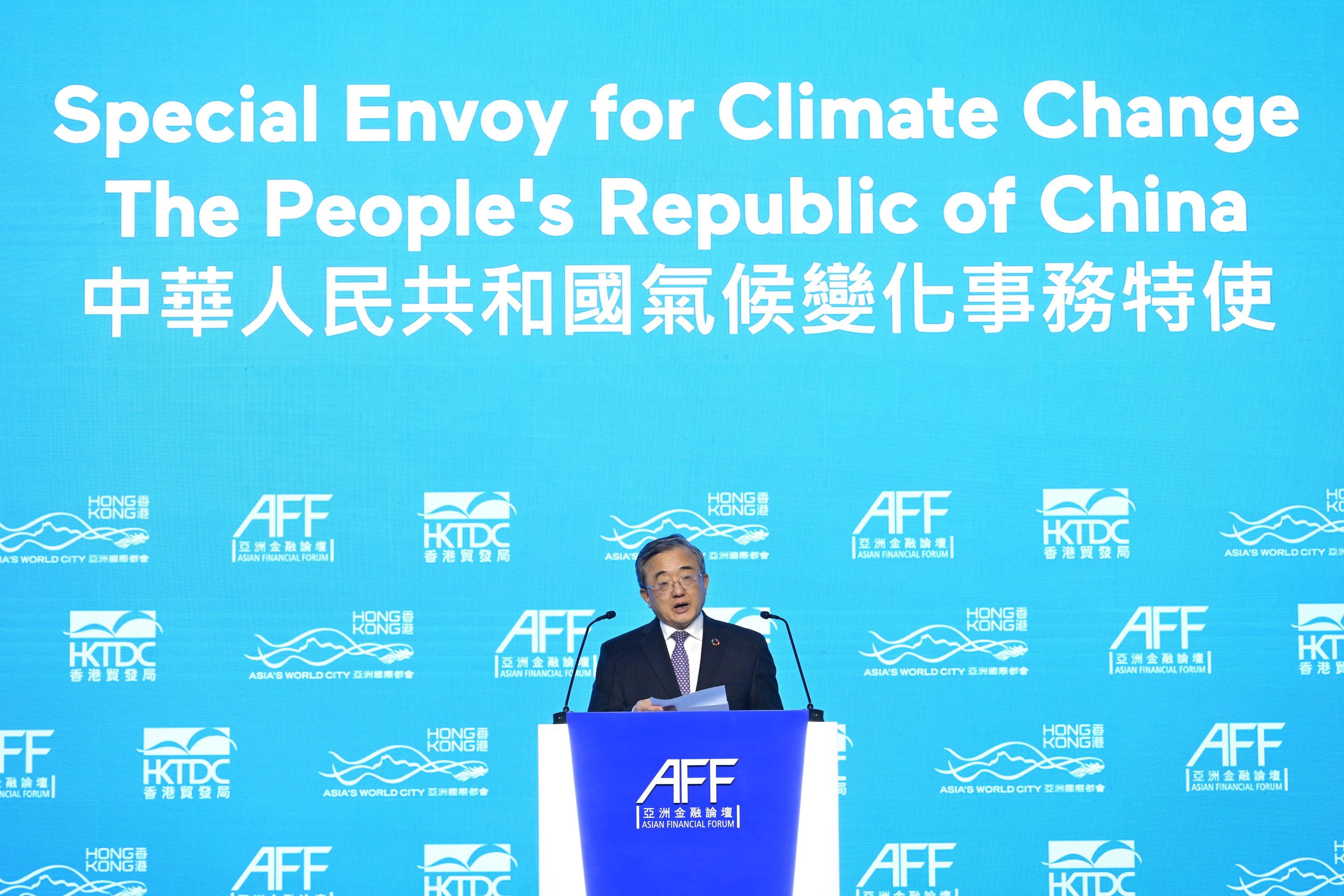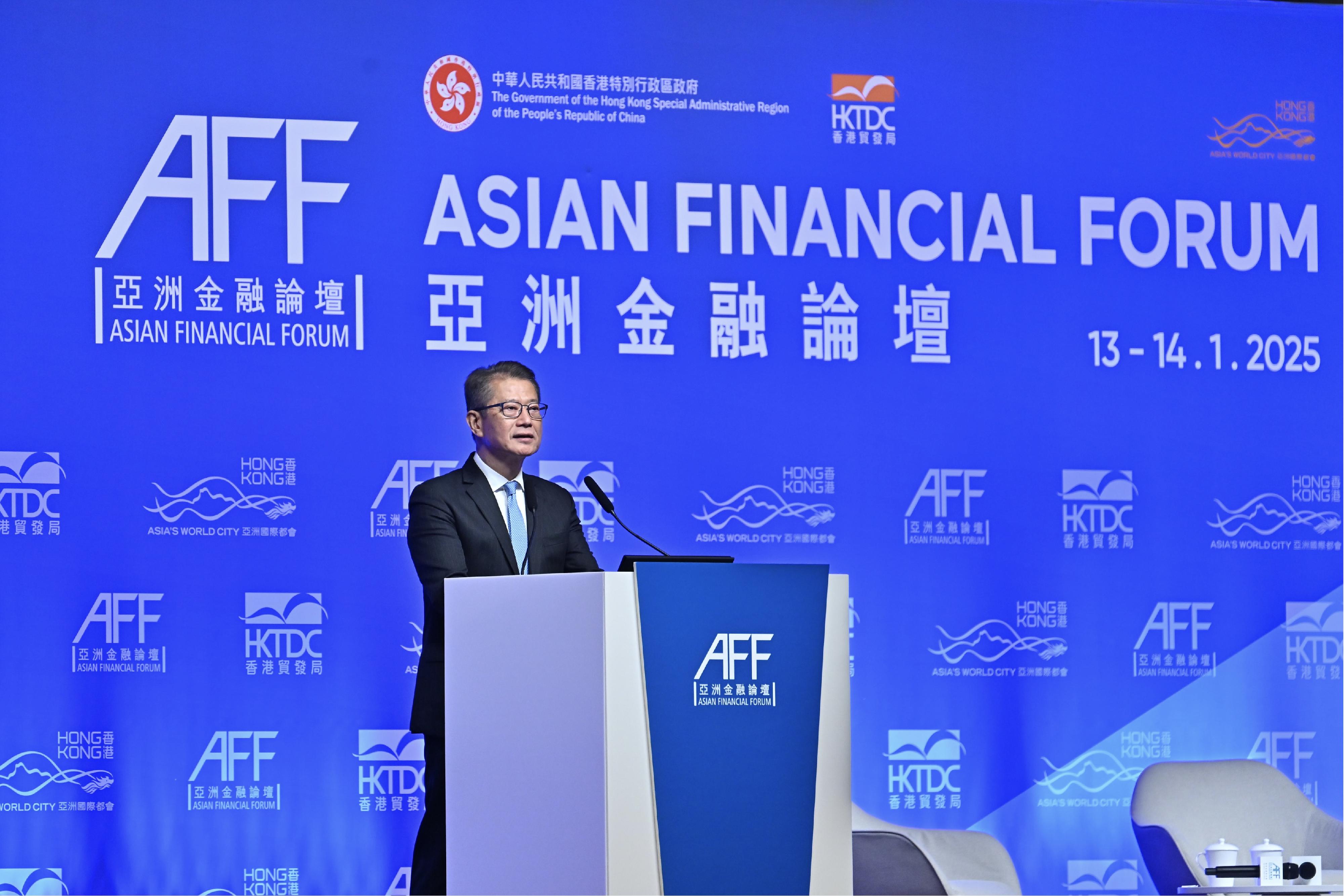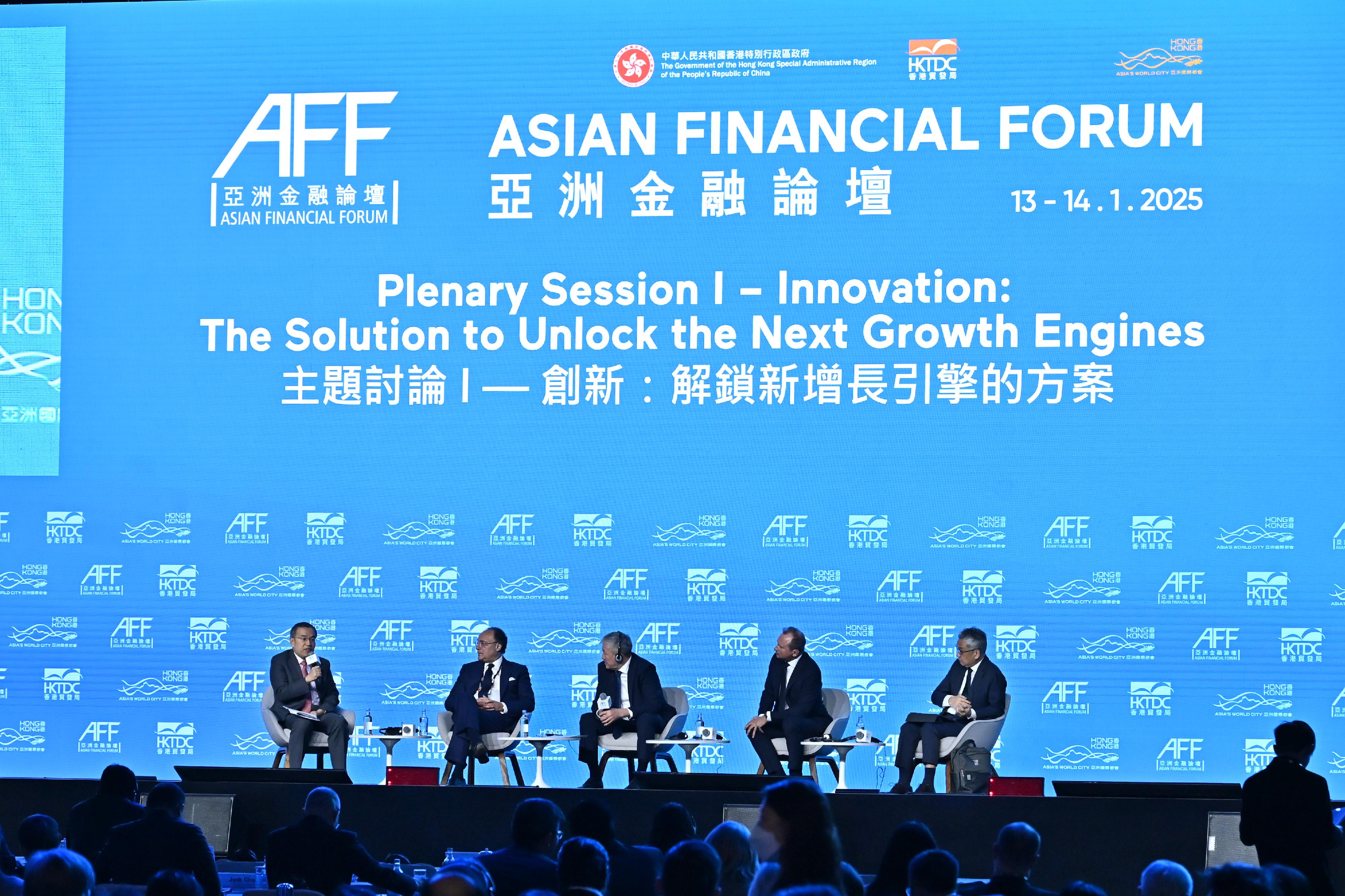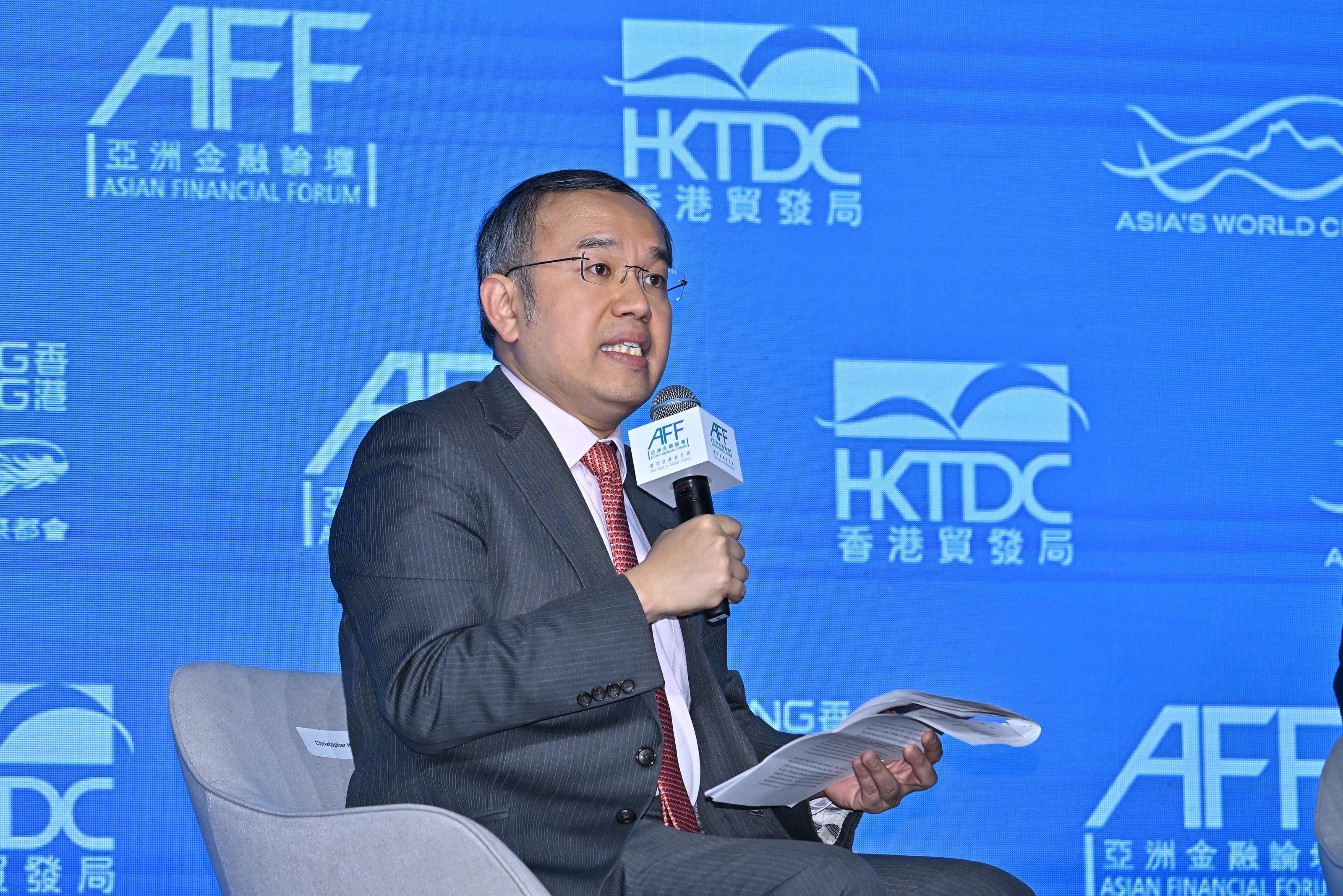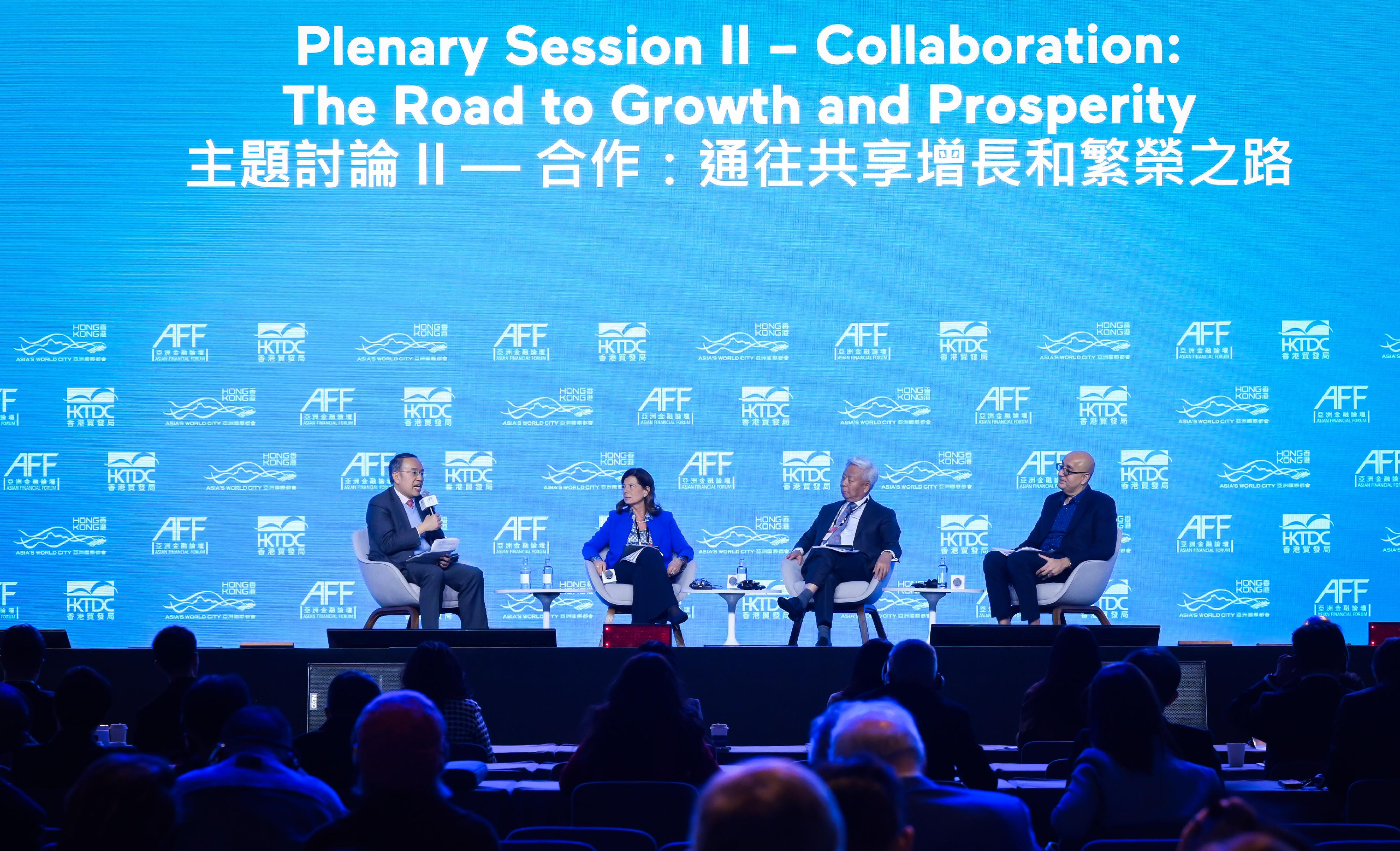The 18th Asian Financial Forum (AFF) opened today (January 13), where heavyweight speakers from around the world have shed light on the latest developments in global financial markets and investment opportunities. With the theme of "Powering the Next Growth Engine", the forum explored ways to achieve breakthroughs in a time of change.
The AFF, co-organised by the Hong Kong Special Administrative Region (HKSAR) Government and the Hong Kong Trade Development Council, has been a flagship financial event in the region. The two-day forum has attracted about 3 600 participants from around 50 countries or regions. Some 130 elite speakers, including government officials, representatives from central banks and regulatory bodies, financial and business leaders, scholars and economists, discussed global economic and financial development, growth potential of emerging markets like ASEAN and the Middle East, and advancements in new financial areas such as artificial intelligence (AI), fintech, sustainable development, family offices and philanthropy.
The Chief Executive, Mr John Lee, highlighted Hong Kong's status as an international financial centre when addressing the opening session of the AFF this morning. He said, "Hong Kong ranked third, globally, and first in Asia, in the most recent Global Financial Centres Index. In last year's World Competitiveness Yearbook, Hong Kong ranked fifth, globally, up two places from the previous year. And we topped the Yearbook's rankings in business legislation and international trade."
He added, "Thanks to 'one country, two systems', we enjoy the strong support of our country China, while developing ever-expanding global ties, making Hong Kong the world's foremost 'super connector' and 'super value-adder'. Our established common law regime dovetails with the legal system of many major global financial hubs. Our professionals are proficient in both Chinese and English, and well-versed with the business practice of both China and the rest of the world." He remarked that Hong Kong is poised to power its next growth engine and contribute to the region's overall development.
Speaking at the opening session, the Executive Vice Director of the Hong Kong and Macao Affairs Office of the State Council of the People’s Republic of China, Mr Zhou Ji, pointed out it is precisely because of the “one country, two systems” principle that Hong Kong has, time and again, emerged victorious from the hit of Asian and international financial crises, the onslaught of SARS and COVID, and the impact of natural disasters and social upheavals, and has rebuilt itself from the ashes and maintained sound development. He added that the “one country, two systems” principle must and will be upheld for a long time. He also said that in the future, the Chinese Government will, as in the past, do its utmost to provide strong protection for supporting Hong Kong in consolidating and enhancing its status as an international financial, trade and shipping centre, as well as for strengthening technological innovation. He believed that with the sound system of “one country, two systems”, the determination of the HKSAR Government, the concerted efforts of all sectors of the community, and the broad support of all the participating guests, the international brand of “Hong Kong, China” will become even more outstanding.
The Governor of the People's Bank of China (PBOC), Mr Pan Gongsheng, said in his special remarks that in recent years, under the strong support of the Central Government and the leadership of the HKSAR Government, Hong Kong has been actively enhancing its traditional advantages and grasping the new development opportunities, which has continuously stimulated great creativity and vitality, consolidating and bolstering its status as an international financial centre. He said that as a next step to continue to fully support the development of Hong Kong as an international financial centre, the PBOC will focus on four key directions: first, to support the development of Hong Kong's capital market and continuously deepen the mutual access between the financial markets of the two places; second, to expand and strengthen Hong Kong's position as an offshore Renminbi business hub; third, to enhance Hong Kong's functions as an international asset and wealth management centre; and fourth, to resolutely safeguard Hong Kong's financial stability and security.
The Special Envoy for Climate Change of the People's Republic of China, Mr Liu Zhenmin, also shared his thoughts on the important role of climate financing in promoting energy transition and advancing green development during the opening session. He praised the HKSAR for being a pioneer in the global response to climate change, noting that Hong Kong reached carbon peaking in 2014, and is now actively implementing the four major decarbonisation strategies of "Net-Zero Electricity Generation", "Energy Saving and Green Building", "Green Transport" and "Waste Reduction" and has achieved remarkable results. He also mentioned that energy transition and green and low-carbon development have become a global trend and an important engine of the world economy, and that Hong Kong, as an important financial centre, could leverage its strengths, take active actions, and empower Asian energy transition through climate financing, so as to make new and greater contributions to global sustainable development.
The Financial Secretary, Mr Paul Chan, delivered welcome remarks at the keynote luncheon. He said, "As an international financial, trade and shipping centre, Hong Kong enjoys unparalleled advantages to connect China with the rest of the world. The essence of it is this: we have convenient and often priority access to the Mainland market, while maintaining all the characteristics of an international city. As a 'super connector' and 'super value-adder', we believe our unique advantages will create value for partners from Asia and well beyond."
Mr Chan highlighted the edges of Hong Kong as an international financial centre, including a full range of funding options catering to the divergent needs of governments and enterprises at different development stages to fund their projects and scale up; and the innovative financial strategies to enhance product offerings such as securitisation of infrastructure loans and catastrophe bonds. Mr Chan also elaborated on the strengths of Hong Kong in innovation and technology in partnership with sister cities in the Greater Bay Area, and the contributions it can make to productivity enhancement and sustainable development in the region. He also explained Hong Kong's role as a multinational high value-added supply chain management centre to support enterprises in aligning or restructuring their industrial and supply chains across different economies.
The former Chief Economist and Senior Vice President of the World Bank, Professor Justin Yifu Lin, also delivered a keynote speech at the luncheon, sharing his insights on the shifting global economic landscape, its impact on the international markets, and China's current trajectory and its evolving role in the world.
The Secretary for Financial Services and the Treasury, Mr Christopher Hui, chaired two Plenary Sessions today. During the first Plenary Session on "Innovation: The Solution to Unlock the Next Growth Engines" held in the morning, Mr Hui and the panellists shared insights on how innovation can drive growth amid a complex landscape with persistent global challenges like regional conflicts, policy uncertainties brought about by the formation of new governments, and climate change, etc. The panellists joining this session were the Federal Minister of Finance and Revenue of Pakistan, Mr Muhammad Aurangzeb; the Chairman of the Cabinet of Ministers – Head of the Presidential Administration of the Kyrgyz Republic, Mr Adylbek Kasymaliev; the Minister of Finance of Luxembourg, Mr Gilles Roth; and the Deputy Secretary-General of Organisation for Economic Co-operation and Development, Mr Yoshiki Takeuchi.
In the afternoon, Mr Hui chaired Plenary Session II themed "Collaboration: The Road to Growth and Prosperity", during which he discussed with renowned speakers on how to enhance collaboration, rebuild trust and foster partnerships among different economies to achieve shared growth and prosperity in an increasingly divided world. The speakers were the Vice-President (Finance and Risk Management) of Asian Development Bank, Ms Roberta Casali; the President and Chair of the Board of Directors of Asian Infrastructure Investment Bank, Mr Jin Liqun; and the Deputy Secretary-General for ASEAN Economic Community, Mr Satvinder Singh.
Another highlight of the first-day programme was the Policy Dialogue chaired by the Chief Executive of the Hong Kong Monetary Authority, Mr Eddie Yue, themed "Accelerating Growth through Innovation". Panel speakers included the Director General of the Monetary Policy Department of The Bank of Mongolia, Mr Bayardavaa Bayarsaikhan; the Chief Economist and Member of Executive Board of European Central Bank, Dr Philip Lane; the Commissioner of Securities and Exchange Commission, Philippines, Mr Rogelio V. Quevedo; and the Governor of Bank of Finland, Dr Olli Rehn. Amid global uncertainties and challenges, they explored how technological advancements and digital transformation could contribute to renewed growth and innovation, and how policymakers can set policies to turbo-charge growth.
The 18th AFF will continue tomorrow (January 14). A brand new session namely the Gulf Cooperation Council Chapter will be held with Mr Hui and the Secretary General of the Cooperation Council for the Arab States of the Gulf, Mr Jasem Mohamed Albudaiwi, delivering keynote remarks, followed by a panel discussion on fostering financial co-operation and investment between the Council and Hong Kong. The Distinguished Professor of Computer Science at the University of California, Berkeley, Co-chair of the World Economic Forum's Council on AI and Co-chair of the Organisation for Economic Co-operation and Development's Expert Group on AI Futures, Professor Stuart Russell, will share his views on development and implications of Generative AI at the keynote luncheon. The Dialogues for Tomorrow sessions will cover discussion on green and sustainable finance as well as fintech.
The two-day AFF encompasses diverse events, including Global Spectrum series, thematic workshops, Dialogues for Tomorrow series, breakfast panel, and fireside chats. Investment opportunities are highlighted through the AFF Deal-making and a great diversity of exhibition zones. In addition, to showcase Hong Kong's vibrant culture, the forum offers experiential activities, sightseeing tours and dining discounts for international participants, encouraging them to make the most of their stay and experience of the city's vitality.
Follow this news feed: East Asia






